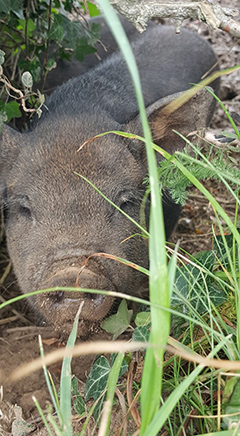Farmers urged to maintain good biosecurity as African Swine Fever detected in Belgium.
The Belgian Authorities have reported two cases of African Swine Fever (ASF) in wild boar close to the border with France. ASF has been spreading in Eastern Europe since it first entered the European Union (EU) in 2014.

In addition to the new cases in Belgium, the disease is already present in a number of EU Member States. The risk of an incursion of ASF to the UK has been raised and is causing concern.
Although the disease does not affect humans and there is no food safety risk associated with meat, ASF is a highly contagious and usually fatal viral disease of pigs. There is no treatment for ASF in pigs and there is no vaccine currently available. ASF is a notifiable disease and, as such, all suspected cases of ASF must be reported the local Divisional Veterinary Office (DVO) immediately.
An outbreak of ASF would have a significant impact on the Northern Ireland’s pork industry affecting productivity and our ability to trade pigs and pork products. This is a timely reminder to stress the need of maintaining a high level of biosecurity and to remain vigilant for signs of disease.
The risk of exposure to the pig population remains low, but this is dependent on the level of biosecurity on individual premises and upholding the swill feeding ban. Keepers are reminded that it is illegal to feed catering waste of any description or domestic food waste to farm animals in the UK, including pigs kept as pets, as some of the outbreaks of ASF in Europe have been attributed to wild boar or domestic pigs consuming contaminated pork or pork products. This includes food from vegetarian kitchens as there is still a risk of cross contamination from products of animal origin such as milk.
Strict hygiene measures are essential in preventing disease – meat or meat products must not be taken into areas where pigs are kept. Food should only eaten in designated areas such as staff rooms or the farm kitchen. Pig keepers, farm staff and anyone in contact with pigs should wash their hands before and after eating or preparing food.
Northern Ireland’s Chief Veterinary Officer, Dr Robert Huey said: “The introduction of African Swine Fever to Northern Ireland would have an enormous impact on our pig industry. It is vital that everyone involved with the pig industry take action and are aware of the current situation. No matter how many pigs you keep, you need to be aware of the potential consequences of feeding waste food to your animals. Not only is it illegal, but you run the risk of spreading disease which could be fatal to your livestock.
“You can purchase a range of pig foods from your local agricultural merchant that can be safely fed to your pigs and which is the most reliable way of giving them a balanced diet. Good biosecurity is also essential for minimising disease risk, such as providing dedicated clothing and boots for workers and preventing vehicles which may be contaminated from entering pig premises.”

























